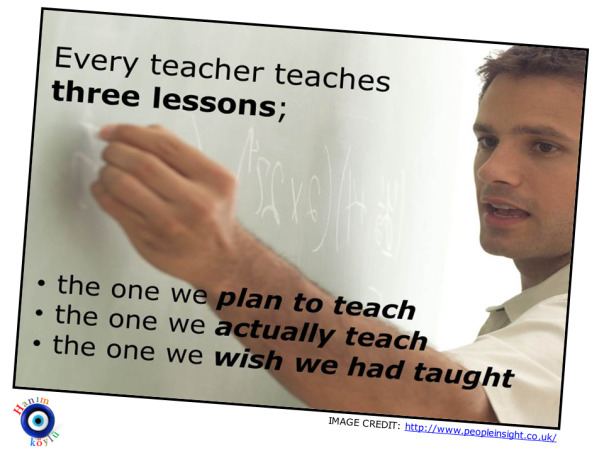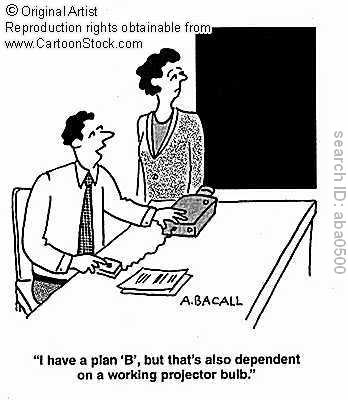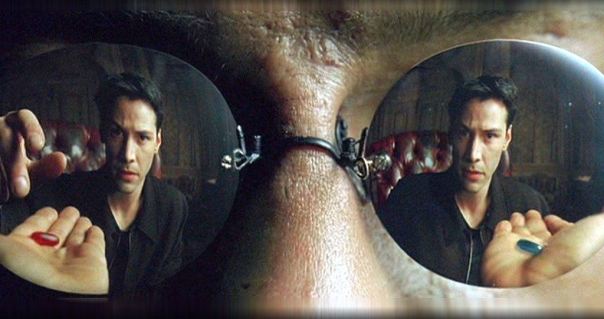8
An old friend of mine caught up with me on Facebook the other day. He was a great “natural” when we worked together in Dubai a few years back – he was a bit of a “maverick”, an architect who taught maths and computing, and enjoyed taking risks.
My kinda teacher…
In his Facebook message he made a “confession” – in all the time we worked together – he had never prepared a “lesson plan”.
He explained that it was “against his religion” and noted:
I always hated the idea of lesson plans…because lesson plans are about what the teacher wants, not what the students need. Education should always start with students’ learning, not teachers’ teaching.
I pointed out that lesson plans were actually quite a good idea – if they were “learner-centred”.
His reply:
Sorry! I assume lesson plans to be teacher creatures that often have very little to do with students. I should have been more specific! Yes, ones that focus on students – good!
It’s often said that every teacher teaches 3 lessons; the lesson you plan to teach (Lesson #1), the lesson you actually teach (Lesson #2) and the lesson you wish you had taught (Lesson #3).
It always made sense to me that if I wanted to “see” the difference between these 3 Lessons, I had to have some form of “lesson plan” for the first of these – so I would get better at the second type by reflecting on the third type.
Does that make sense?
The problem was, as my friend noted, when I was “trained” as a teacher I was asked to jump through all sorts of silly hoops and prepare 3 or 4 page lesson plans for every single “dreaded” observation.
Now, I know this was probably not the intention of my teacher trainers (we wrote on “slates” in those days and the “Learning rEvolution” hadn’t quite “kicked off”) because we spoke about this – a lot!.
A typical conversation went something like this:
Tony: Come on, this is just a waste of time – you can’t seriously believe this is going to help me be a better teacher.
Trainer: Look, I know it and you know – but this is what {INSERT name of exam board} want. If you don’t do, they’ll fail you.
Tony: You mean YOU will fail me!
Trainer: YES!…just get through the observation…you can do what you want when you get the bit of paper!
I actually liked the trainer! And, did everything she said…especially the last bit!
When I started teaching full-time, I quickly realised that it was not what I wanted to do (as a teacher) that was important – it was what I wanted the students to do that really “mattered”!
It also dawned on me (some time after the fact) that everything my trainer had “learned” me was not stupid – the one thing on the lesson planning form I had to repeatedly complete in my training emphasised “objectives”. The problem was that {INSERT name of exam board} defined these as “teaching objectives” – not “learning outcomes” (I think they may have evolved since then).
OK – I had “translated” that to mean “purpose” and brought it together with the idea of “what will the students be able to do with what they learn”. This focus on “purpose” led me to another discovery – that in every “lesson”, I should have a “big idea” that students would “get” and take away with them.
It was these three things that always formed the basis of Lesson #1 – the written version. Rather than writing down every single “step” I was going to do (with “specific timings” and “classroom interaction patterns”), my lesson plans were about the steps the students would do – and how I would know if the steps students were taking actually helped “create learning”.
This actually meant that Lesson #2 started to get better – I was more relaxed, I didn’t have to keep looking at my notes (written on a slate, of course) and I could focus on “being with” my students much more (rather than “teaching at” them).
The beauty of this approach meant that I was more willing to focus on Lesson #3 – and got better much faster.
And, you know what else? Observations stopped being so “dreaded”!
So, to sum up:
YES, lesson planning is important and useful (when you focus on “purpose”)
YES, lesson plans should be about what the students will do (and what they will be able to do with what they learn “with” you)
YES, lesson planning can help you become a better teacher
NO, format does not matter – and size certainly doesn’t…
For those of interested in getting better at planning (and reflecting on) your lessons, why don’t you take a look at one of my “libraries”: Tony’s LESSON PLANNING Library





Hi Tony-
Glad you recycled this post, and glad I saw your comment about it on Dave’s post.
There’s a nice grassroots movement going on in education these days. I’m excited to see where it takes us. Have subscribed to the blog 2 catch more of the action.
Cheers, Brad
Ah, yes, I miss those days of lesson planning on slate. The slate wasn’t that big, so not too much detail – just objectives and rough idea of order of activities. Chalk meant that the lesson plan stayed flexible – it was easy to erase things and rethink mid-lesson …
I have to admit that most of my lesson planning is in my head – don’t think I’ve written one down on paper for 15 years. But the planning I do in my head is still influenced by the planning I had to do on paper in the past. In my head, I can still hear the voice of my dip tutors asking me to think about why I’m planning on doing something, what the students will learn/practice – getting me to focus on objectives (or learning outcomes) rather than just on activities. Hated having to write out lesson plans at the time, but looking back I’m glad I did.
Reblogged this on allthingslearning and commented:
Did this a while back – but it has proven to be very popular so I’m re-blogging it for folks newer to allthingslearning. Enjoy!
That’s exactly what my trainer said too. Perhaps the CELTA shoudl be changed if everyone knows it is silly. I think you are judged on how well you teach the plan but you can’t plan for everything and it’s the unplanned moments that are the best.
Hi Phil,
Thanks for dropping in 😉 I never said it was the CELTA (or CTEFLA – showing me age) – but it WAS 😉 LOL…..
The funny thing was my “trainer” and I became great friends – always apologised for saying this to me 😉
Take care,
T..
Loved the post, and the threefold way of looking at lesson planning.
I’ve done a lot of CELTA and DELTA training and actually don’t think that writing the plans is a waste of time. For me, these detailed plans have two valuable aspects. Firstly, it forces you as either an inexperienced teacher, or one who is trying to analyse and reassess their teaching, to really think through why you are doing what you are doing and what you hope to achieve. Secondly, it enables the observer to ‘read your mind’, so they know why you chose to do something and how it relates to everything else in the lesson. I think planning for an observation, especially on a training course, is completely different from planning for your daily lessons. Most of my daily planning goes on in my head, with just an outline on paper.
But having done a detailed plan DOESN’T mean you have to stick to it rigidly at all- it’s always much more important to respond to what’s actually happening in the classroom. So, I wouldn’t agree that you are judged on how well you teach the plan (first type). I’d hope you’d be judged on how well you teach the students (second type) and on your reflection (third type).
Dear Tony,
It’s been so helpful for me to read this post of yours. Perfect timing just before my TP in ICELT. I was thinking like you and unfortunately I was penalized mostly because of my lesson plans so far. I’ll stop by your lesson planning library soon and try to focus more on ‘purpose’ next time.
Thanks very much:)
Merve,
Good to hear it was useful – I know there are still some issues with “assessment” programmes (not always the fault of trainers – but the systems they are asked to use) and they need to think about these things too. After all, TEACHing does not equal LEARNing 🙂 Let me know how the TP goes 🙂
T..
[…] was an interesting exchange about planning recently on Tony Gurr’s excellent blog . I’ll let you check it out the debate for yourself, but the quote that stuck for me [i.e. […]
This site was… how do I say it? Relevant!! Finally I have found something that helped me.
Kudos!